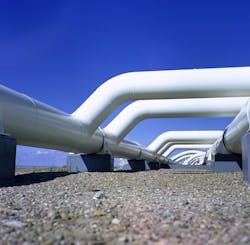Neptune Energy Netherlands has awarded assurance and risk management company DNV the contract for a carbon capture and storage (CCS) pipeline materials study to assess the fracture and suitability of offshore pipelines for reuse in CO2 transport.
The first phase of the DNV study will identify advanced approaches to ductile fracture assessments in dense-phase CO2 pipeline systems and the applicability of such assessments to both welded and seamless subsea line pipe. This phase will involve technical literature reviews to understand the most appropriate approach to characterize material failure behavior.
The most suitable approach identified in Phase One will be used in Phase Two of the study to assess the likely suitability of existing pipelines for dense-phase CO2 transport at up to 120 bar.
The output of the study will inform the ongoing Neptune feasibility study to provide an increased level of confidence in the suitability, or otherwise, of existing pipelines which would be used to inject 5-8 million tonnes/year of CO2 into depleted gas fields.
“Given the existing infrastructure that connects offshore with onshore, there is real potential for the Dutch North Sea to develop new energy faster, more efficiently, and in a safe way,” said René van der Meer, head of new energy at Neptune. “With support from partners, such as the experienced team of DNV, we are well placed to enable offshore CCS and offshore green hydrogen production using existing infrastructure. Using what is already there, will not only speed up new energy projects, but will cost significantly less and it doesn’t unnecessarily disturb the surroundings like the seabed.”
